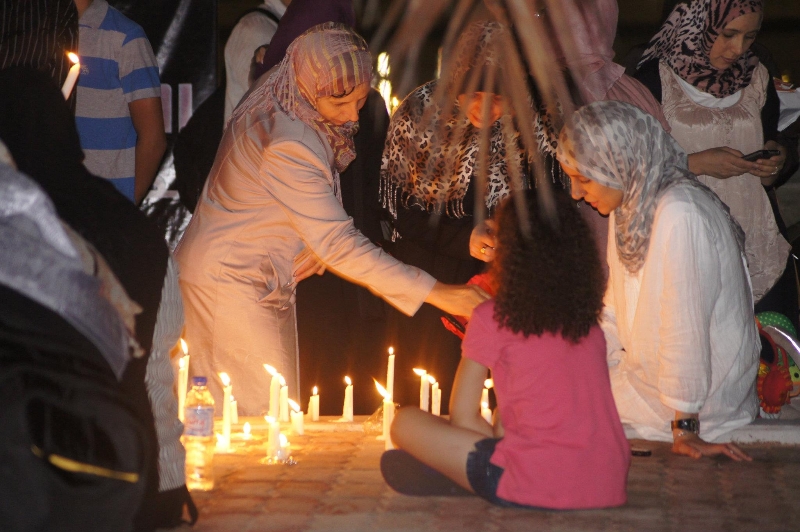By Niz Ben-Essa.

Tripoli, 22 August.
Over the last few weeks, issues and discussions regarding women in Libya have come to the surface. . . .[restrict]People have been discussing the issues at coffee shops, on facebook and twitter groups, with friends, with family, NGOs, CSOs, independent activists, politicians, … the debate has been widespread.
Opinions have been as varied as they are for almost any topic of discussion in Libya, ranging from the doomsday apocalyptics, to those who simply do not care, and of course everything in between.
Recently, incidents such as the abduction of women in Libya, a seemingly increased rate of street harassment in Tripoli and the removal of the unveiled presenter at the NTC-GNC authority handover ceremony have all contributed to the discussion and have brought the issue to the much needed lime light as an issue critical for Libya’s sustained progression.
It is clear, and we are all in agreement, that the harassment of women, whether sexual, verbal or otherwise, is neither Islamic nor is it lawful under any other code of ethics. But it happens on an almost daily basis in Libya. Why?
Our issues, I believe, lie in our society. A society conditioned to behave a certain way. Empowered through silence and apathy to behave in ways that are not inherently or historically Libyan, which are not associated with Islamic values and which should not be acceptable in any culture or region of the world.
It is not unusual for society to be “conditioned”. In the west, the media, through its glossy magazines and its glitzy TV shows, continuously conditions women to think in a conformist way when it comes to appearance, fashion or behaviour. As free as the people in the west perceive themselves to be, they are slaves to society’s definition of beauty and “normality”, and are slaves to the pressures of that society.
Libya is certainly not immune to the phenomena of conditioning, perhaps not through the media as much, but as much through our society as it is in the west.
As much as I hate the continued use of Qaddafi as an excuse for all our ills, it must be acknowledged that 42 years of autocratic, authoritarian rule has created a society not empowered to believe that change is possible. This is what made the February 17th revolution so remarkable. The fact that it broke the shackles of apathy and fear, which had previously crippled us into thinking that we cannot, and so will not, do anything to better the society around us.
But these shackles are now broken. Libya has a new spirit. We can, and so we will, do what it takes to better our society.
Libya’s freedom does not come in the fall of the tyrant’s regime, but rather in the liberty of its citizens to be expressive, to value the diversity of opinion and the diversity of ethnicity and culture, to empower its “weak” to no longer be weak, to provide equality and opportunity for all those who make up its society.
The Free Generation Movement has been involved in the creation of a coalition of Libyan based groups and activists who are concerned by the authority’s neglect of Women’s Rights issues in Libya. What concerns us in this coalition is how many people of authority speak privately about their disgust at what happened at the handover ceremony, and in private speak so passionately about the right of women to be involved, free and equal, and yet are so reluctant to make these declarations public. It is this silence that haunts us and concerns us.
The silence of our leaders is conditioning and, as they say, deafening. The silence is empowering. It is empowering for those who seek legitimacy in the wrongs that they do and the evil that they spread. Silence is far more powerful than any fatwa or ruling or law. It is silence, as Einstein once said, that makes the world a dangerous place, not the people who do evil.
So much hope and so much responsibility has been entrusted into our first democratically elected national governing body in over half a century, and yet not a single one of its 200 members has publicly denounced what happened at the ceremony that handed them the nation’s leading seat of governance.
There are private conversations, YouTube videos and personal accounts which suggest that most of those present showed disdain at what happened that night, yet they chose to keep their thoughts private. Why?
Those we have entrusted to lead and serve us have an opportunity to make a stand, an opportunity to use their position and to use their voice to begin to shape our society and drive our progressing in a direction that is inclusive and respectable and ethical.
They have an opportunity to re-condition our society and drive it out of the darkness that made it ok to publicly humiliate a woman, to harass a woman walking down the street, to judge a woman on her choices, to deny a woman her rights and her place.
We are not calling for the rights of our society to transgress our cultural norms nor our legal or religious obligations. The right of expression and the freedom of choice must exist within the confines of decency and respect. But with the guarantee that, in return, one would enjoy the very same decency and the very same respect from others.
We have a long way to go. Our ills will not be cured over night. But we hope that breaking the silence will be a significant step for us all.
Niz Ben-Essa
Founder of the Free Generation Movement.
The Free Generation Movement is a Libyan based NGO made up of independent activists. It was founded in February 2011 as a resistance movement within Tripoli and has now evolved into engaging socio-political and environmental issues in Libya. [/restrict]




